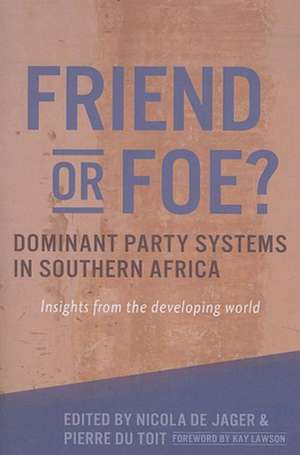Friend or Foe? Dominant Party Systems in Southern Africa: Insights from the Developing World
Editat de Nicola de Jager, Pierre du Toiten Limba Engleză Paperback – 20 dec 2012
Within southern Africa, there is an observable increase in dominant party systems, in which one political party dominates over a prolonged period of time, within a democratic system with regular elections. This party system has replaced the one-party system that dominated Africa's political landscape after the first wave of liberations in the 1950s and 1960s. This book seeks to understand this trend and its implications for southern Africa's democracies by comparing such systems in southern Africa with others in the developing world (such as India, South Korea, and Taiwan). In particular, the case of Zimbabwe stands out as a concerning example of the direction a dominant party can take: regression into authoritarianism. India, South Korea, and Taiwan present alternative routes for the dominant party system. The salient question posed by this book is: Which route are Botswana, Namibia and South Africa taking? It answers by drawing conclusions to determine whether these countries are moving toward liberal democracy, authoritarianism, or a road in between.
Preț: 296.56 lei
Nou
Puncte Express: 445
Preț estimativ în valută:
56.75€ • 60.68$ • 47.31£
56.75€ • 60.68$ • 47.31£
Carte tipărită la comandă
Livrare economică 17 aprilie-01 mai
Preluare comenzi: 021 569.72.76
Specificații
ISBN-13: 9789280812206
ISBN-10: 9280812203
Pagini: 232
Dimensiuni: 152 x 229 x 14 mm
Greutate: 0.33 kg
Editura: Brookings Institution Press
Colecția United Nations University Press
ISBN-10: 9280812203
Pagini: 232
Dimensiuni: 152 x 229 x 14 mm
Greutate: 0.33 kg
Editura: Brookings Institution Press
Colecția United Nations University Press
Notă biografică
Nicola de Jager is a lecturer in the Department of Political Science at the University of Stellenbosch. Pierre du Toit teaches in the Department of Political Science at the University of Stellenbosch.
Descriere
A United Nations University Press with University of Cape Town (UCT) Press publication
Within southern Africa, there is an observable increase in dominant party systems, in which one political party dominates over a prolonged period of time, within a democratic system with regular elections. This party system has replaced the one-party system that dominated Africa's political landscape after the first wave of liberations in the 1950s and 1960s. This book seeks to understand this trend and its implications for southern Africa's democracies by comparing such systems in southern Africa with others in the developing world (such as India, South Korea, and Taiwan). In particular, the case of Zimbabwe stands out as a concerning example of the direction a dominant party can take: regression into authoritarianism. India, South Korea, and Taiwan present alternative routes for the dominant party system. The salient question posed by this book is: Which route are Botswana, Namibia and South Africa taking? It answers by drawing conclusions to determine whether these countries are moving toward liberal democracy, authoritarianism, or a road in between.
Within southern Africa, there is an observable increase in dominant party systems, in which one political party dominates over a prolonged period of time, within a democratic system with regular elections. This party system has replaced the one-party system that dominated Africa's political landscape after the first wave of liberations in the 1950s and 1960s. This book seeks to understand this trend and its implications for southern Africa's democracies by comparing such systems in southern Africa with others in the developing world (such as India, South Korea, and Taiwan). In particular, the case of Zimbabwe stands out as a concerning example of the direction a dominant party can take: regression into authoritarianism. India, South Korea, and Taiwan present alternative routes for the dominant party system. The salient question posed by this book is: Which route are Botswana, Namibia and South Africa taking? It answers by drawing conclusions to determine whether these countries are moving toward liberal democracy, authoritarianism, or a road in between.












